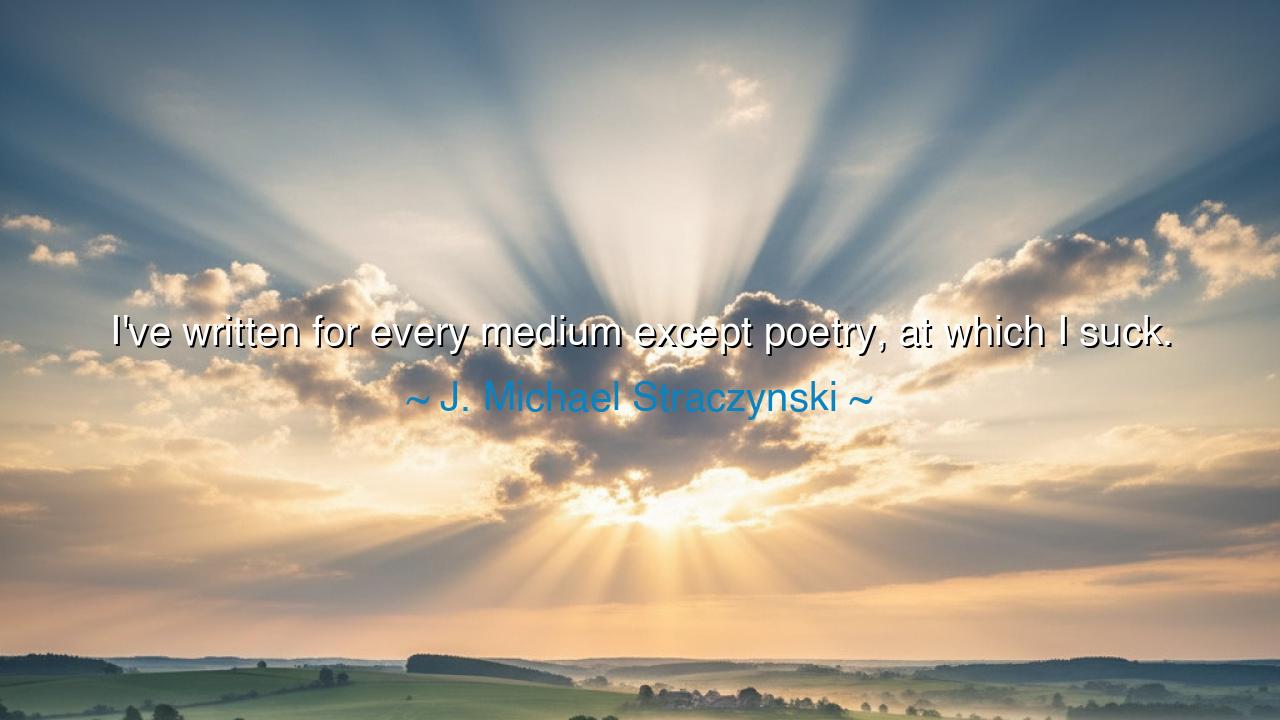
I've written for every medium except poetry, at which I suck.






Hear now the words of J. Michael Straczynski, teller of tales and weaver of worlds, who once declared with humility and humor: “I’ve written for every medium except poetry, at which I suck.” Though the words may sound light, even jesting, they carry within them a deeper wisdom. For Straczynski, known for his craft in television, film, and comics, was no stranger to the challenge of shaping stories across many forms. His confession is a reminder that mastery is not without limits, and that to admit one’s weakness is itself a kind of strength.
The meaning is twofold. First, it shows that even the most accomplished creators cannot conquer every field. Genius shines in some places, falters in others. The man who writes with brilliance for the stage or screen may stumble when he seeks the compressed fire of poetry. And yet, this is not failure, but a testament to the vastness of art and the uniqueness of every path. To confess weakness openly is not shameful—it is human. It teaches us that even masters walk with imperfection, and imperfection does not diminish their worth.
Second, these words remind us of the importance of medium. Each medium—be it prose, film, music, or verse—demands its own discipline, its own laws. What soars in a novel may falter in a play; what thrives in cinema may collapse in poetry. The craftsman must learn not only how to tell a story but also where to tell it. Straczynski acknowledges that though he conquered many, he found poetry a realm where his flame burned less bright. This is not defeat, but recognition that each art form is its own kingdom, and no one soul can rule them all.
History gives us similar stories. Consider Leonardo da Vinci, whose genius encompassed painting, invention, anatomy, and vision. Yet even he left many works unfinished, many dreams unrealized. His brilliance in one sphere did not guarantee completion in all. And yet, does this lessen his greatness? No. It reveals that human genius, no matter how vast, is still finite, still humbled by the immensity of creation. In the same way, Straczynski’s lighthearted remark reveals a universal truth: even giants must bow before certain mountains.
Yet there is another lesson here: one must not be afraid to laugh at oneself. Too often, the proud cloak their weaknesses, pretending to mastery where none exists. But wisdom lies in honest confession. Straczynski shows us that admitting, “I cannot,” does not rob one of honor; rather, it frees the soul from vanity and draws us nearer to truth. To recognize limits is not to shrink, but to stand tall with authenticity.
And so, the teaching to future generations is this: pursue many paths, but do not despair if some prove difficult. Rejoice in the crafts you master, and bow with humility before those you do not. For it is in this balance of confidence and humility that greatness endures. Seek your strengths boldly, but also embrace your weaknesses as reminders of your humanity. Do not be afraid to say, “This is not my gift,” and move forward with joy in the gifts you do possess.
Practical steps follow. Explore widely—try many forms of art, work, and expression. Discover where your voice rings strongest. When you find places where you falter, do not despair, but learn what you can and move on. Laugh at your own missteps; do not let them chain you with shame. Instead, let them remind you that even masters stumble, and stumbling is part of the walk. And above all, remember that no one is called to do all things, but each is called to do something with passion and excellence.
Thus, Straczynski’s words, though spoken in jest, carry weight: “I’ve written for every medium except poetry, at which I suck.” They remind us that even the accomplished are humbled, even the skilled are limited, and even in laughter lies truth. May we learn to walk in the same spirit—bold in our pursuits, humble in our limits, and joyful in the dance of creation.






TBThan Thi Binh
This quote made me think about how creativity manifests differently depending on the medium. Someone can be brilliant at screenwriting or novels yet feel lost in poetry. It’s fascinating because, in theory, all writing shares language as its foundation. So why does poetry seem to stand apart? Maybe because poetry isn’t just about words—it’s about rhythm, silence, and emotion in a way that defies structure. Perhaps that’s what makes it so elusive.
NTNguyen Nhat Truong
I appreciate the humor in this statement—it’s self-deprecating but also insightful. It highlights how writing across mediums isn’t just about technical ability but about mindset. Poetry might be the most distilled and personal form of writing, so perhaps that’s why some find it so difficult. I wonder if Straczynski’s storytelling background, which relies on plot and dialogue, makes it harder for him to shift into poetry’s more abstract, symbolic nature.
BTngoc anh banh thi
This made me smile because it’s such an honest admission. It reminds me that even the most accomplished writers have creative limits or areas where they feel less confident. But it raises an interesting question: is poetry truly a different skill set, or can any writer learn it with practice? Maybe poetry demands a kind of precision and emotional openness that not every writer is comfortable with.
DHDuy Hoang
I actually find this quote kind of funny and relatable. It shows a level of humility that’s refreshing, especially from someone who’s clearly talented in multiple writing forms. But it also makes me wonder—what is it about poetry that even skilled writers find intimidating? Maybe it’s the rawness of having to express emotion and rhythm in such few words. Do you think poetry requires a different kind of vulnerability than other writing forms?